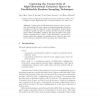Free Online Productivity Tools
i2Speak
i2Symbol
i2OCR
iTex2Img
iWeb2Print
iWeb2Shot
i2Type
iPdf2Split
iPdf2Merge
i2Bopomofo
i2Arabic
i2Style
i2Image
i2PDF
iLatex2Rtf
Sci2ools
100
click to vote
IPPS
1998
IEEE
1998
IEEE
Capturing the Connectivity of High-Dimensional Geometric Spaces by Parallelizable Random Sampling Techniques
Abstract. Finding paths in high-dimensional gemetric spaces is a provably hard problem. Recently, a general randomized planning scheme has emerged as an e ective approach to solve this problem. In this scheme, the planner samples the space at random and build a network of simple paths, called a probabilistic roadmap. This paper describes a basic probabilistic roadmap planner, which is easily parallelizable, and provides a formal analysis that explains its empirical success when the space satises two geometric properties called -goodness and expansiveness.
Distributed And Parallel Computing | IPPS 1998 | Probabilistic Roadmap | Probabilistic Roadmap Planner | Randomized Planning Scheme |
| Added | 05 Aug 2010 |
| Updated | 05 Aug 2010 |
| Type | Conference |
| Year | 1998 |
| Where | IPPS |
| Authors | David Hsu, Lydia E. Kavraki, Jean-Claude Latombe, Rajeev Motwani |
Comments (0)

